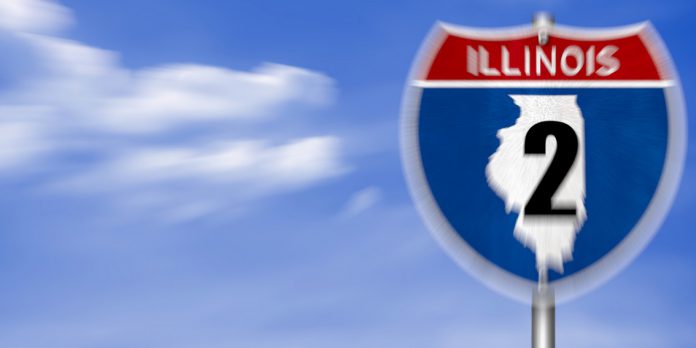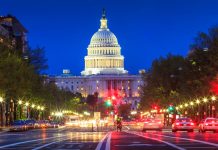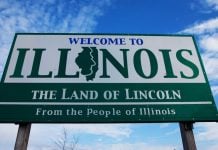Illinois became the second biggest US sports betting state in April, despite suffering the steepest month-on-month decline in sports wagering volume in the young market’s history. Alongside New Jersey it becomes only the second state to achieve an April handle of more than $500m.
The decline in wagering was in line with a typical seasonal slowdown in sports betting that affected nearly every US market, and less than expected with the return of in-person registration on April 4, according to analysts from PlayIllinois.
Betting at Illinois’ retail and online sportsbooks fell 15.2% to $537.2m in April from the record $633.6m in March, while betting volume dropped to $17.3m per day over the 31 days of the month from $20.4m per day in March.
April’s handle created $43.6m in adjusted gross revenue, down from $44.3m in March, yielding $6.5m in state taxes and more than $527,100 in local taxes. The state has now produced $4.1bn in wagering since sports betting launched in 2020.
“Without the NFL or a major sports betting holiday like March Madness a decline in April was a near certainty,” said Joe Boozell, analyst for PlayIllinois.com.
He added: “The Illinois market faced a double-whammy with the return of in-person registration, which will eventually eat away at the market’s ceiling even if it hasn’t dramatically impacted handle yet. And there is no easy solution to that without a legislative fix.”
All but one US legal sports betting jurisdiction reported a month-over-month decline in April wagering, including the 10 largest markets. Illinois’s decline was more than New Jersey (-13%), Tennessee (-13.6%), and Pennsylvania (-14.4%), but shallower than Colorado (-18.8%), Virginia (-22.1%), Indiana (-25.4%), Iowa (-26.7%), Nevada (-29.1%), and Michigan (-30.5%).
Despite the decline in April only New Jersey took in more wagers, making Illinois the No. 2 market in the US. Nearly all of those declines can be explained by the expected seasonal drop in sports betting, which typically begins in April and continues until the football season. Illinois’ handle, though, also faced the return of in-person registration requirements, and the impact came swiftly.
“Illinois is proving to be remarkably resilient as a market, overcoming the inconvenience of in-person registration at least temporarily,” said Jessica Welman, analyst for the PlayUSA.com network, which includes PlayIllinois.com.
She continued: “A concerted push before in-person registration went into place likely helped lessen the short-term effects, but it will be difficult for Illinois to keep pace with the nation’s top markets over the long term.”
The NBA easily generated the most action in April with $171.4m, which was down from $365.7m. Baseball was the second-most wagered-on sport, generating $121.2m in bets. Online wagering accounted for 95.5%, or $513.2 million, of all bets in April.
With the partial removal of the ban on wagering on in-state college teams — allowing retail sportsbooks to take bets on Northwestern, Illinois, Northern Illinois, and others — the state legislature did give retail books something to look forward to when college football returns. But the ban will remain for online sportsbooks, which will mute the importance of the change.
“The change is a positive one, but it won’t make a significant difference in the short-term,” Boozell warned. “Illinoisans overwhelmingly place their bets online. So, any change that only affects retail betting will be limited in its impact. Hopefully this will be an incremental step toward lifting the ban entirely.”
FanDuel/Fairmont’s online and retail sportsbooks attracted $177.8m in bets, the first time FanDuel has topped the market. DraftKings/Casino Queen was second with $169.6m in combined handle. BetRivers/Rivers Casino fell to $84.3m in combined handle. Barstool/Hollywood Casinos was fourth with $51.4m, in its first full month of online operation.
“FanDuel catching DraftKings is a seismic shift in the dynamics of the market, and a credit to FanDuel’s campaign to register bettors ahead of in-person registration,” Welman said.
“Barstool’s push to register customers before in-person registration took effect made a difference, too. But it will be difficult to make significant inroads on the market leaders, which all had months of being able to register customers unencumbered.”














